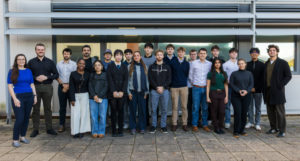Exeter partners in new Alzheimer’s Society centre championing upcoming dementia researchers

The next generation of dementia researchers will be supported and nurtured through the start of their careers through a new Alzheimer’s Society Doctoral Training Centre, run in partnership with the University of Exeter.
The new centre, led by Newcastle University, will specialise in training academics working on Lewy Body Dementia. One of the most common forms of dementia Lewy Body has very challenging symptoms for the individual with the condition and their loved one and yet it is not well understood. This centre will focus on understanding underlying causes of Lewy body dementia, develop technology to track its progression, improve its diagnosis and care as well as support the design of clinical trials into this under researched disease.
Professor Louise Allan, academic lead for the new centre at the University of Exeter, said: “We’re delighted to be participating in the new Doctoral Training Centre, funded by the Alzheimer’s Society. Lewy body dementias are an important cause of dementia which are often overlooked and less researched than other dementias. With this training centre, we will be able to make a contribution to addressing this problem and will build the capacity of researchers to work on this area in the future.”
Professor John-Paul Taylor from Newcastle University said: “The amazing support of Alzheimer’s Society for our doctoral training centre presents a huge opportunity which means that we can develop a critical mass of highly motivated researchers united around our mission to improve the lives of people living with Lewy body dementia and related conditions.
“By bringing together experts from various fields who will work with and support our students, we’ll generate new ideas and diverse approaches that can accelerate discoveries and translate into real-world healthcare improvements for people living with dementia.”
Dementia is the UK’s biggest killer but there is still no cure. With this new, bold and ambitious generation of researchers, life-changing breakthroughs can be achieved which are so desperately needed by people living with this devastating condition.
Currently only one in five dementia PhD students go on to stay in dementia research, often leaving due to underfunding and the challenging nature of academic careers. Recent news of potential new treatments in dementia highlights again that researchers taking their first steps into the field will be the dementia research leaders of the future. They are critical to maintaining the momentum to end the devastation caused by dementia.
The new Alzheimer’s Society Doctoral Training Centres, which build on a previous model led by the charity, will play a pivotal role in encouraging people to enter the field of dementia research, as well as create a supportive network. They will provide PhD students with unique access to activity across the centres – widening their options for peer support, networking, knowledge sharing, training, and equipment. This has previously shown to have a powerful effect in helping to support PhD students to continue their careers in dementia research.
The centre is one of three nationally to be supported by Alzheimer’s Society. Together, they will support nearly 90 students over five years to enter dementia research.
They will focus on building knowledge and understanding in areas that have been particularly underfunded. The other two centres will focus on understanding how changes to blood vessels and our immune systems contribute to dementia (led by Manchester University), and Integrated Care led by Queen Mary University, London). The Doctoral Training Centres will represent networks of researchers from a range of institutions working on the same research topic with varying expertise and specialisms.
Fiona Carragher, Chief Policy and Research Officer at Alzheimer’s Society said: “Dementia is the biggest health and social care issue of our time. By 2040, 1.4 million people will be living with the condition in the UK. And yet a worrying number of dementia researchers leave the field after finishing their PhDs, so a catastrophic amount of talent and expertise is being lost.
“This is a significant investment, that aims to urgently attract and nurture a new, bold and ambitious generation of researchers so we can ramp up the speed and progress of life-changing breakthroughs so desperately needed for people living with this devastating condition.
“These Doctoral Training Centres will give students in the early stages of their dementia research careers fantastic opportunities to collaborate with their peers and build knowledge, as well as access world-class expertise, the latest technology and training. Their research will lead to vital new knowledge where huge gaps remain.
“Research will beat dementia, but we need to make it a reality sooner. One in three people born today will go on develop dementia in their lifetime, so it’s vital we boost the research field to help people now and give hope to those who will be affected in the future.”



